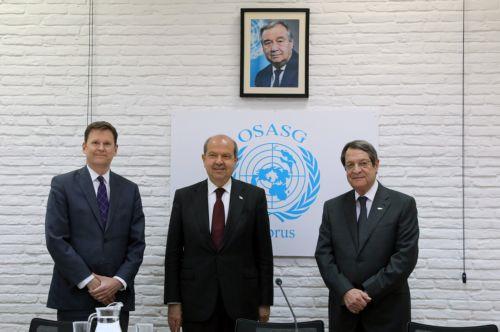Nothing contributes more to the unification of Cyprus than expanding trade and business ties and providing the infrastructure to support them, the UN Secretary-General’s Special Representative for Cyprus, Colin Stewart, said on Tuesday.
In his speech at the Economist Conference in Nicosia, Stewart referred to the importance of trade and business ties between the two communities on the island towards reviving hope for a comprehensive settlement of the Cyprus problem.
“This is the surest way to restore confidence in a solution. Although the voices of protectionism are the loudest, there is direct mutual benefit from increased trade,” he added.
The special representative reiterated his belief “that more economic activity between the two sides of the island makes good business sense and would have a positive impact on the lives of Cypriots on both sides of the island. Any gradual improvement would pave the way towards a mutually acceptable solution to the Cyprus problem.”
“The dire economic situation in the north undermines the prospects for a settlement,” Stewart said, noting that, as some continue to believe, it does not help move the north towards a solution.
He repeated that more dependence by the occupied north on Turkey, particularly economically, means less interdependence between the two sides of the island, and stressed that if current trends continue, the idea of a mutually acceptable settlement will soon become unviable. But he pointed out that “there is much we can and must do to reverse these trends”.
Nothing brings people together faster and stronger than economic interest, he said, adding that this “is the surest way to restore confidence in a solution.”
“Integrating the island in practice paves the way for a political solution,” he said. “As the European Union’s experiment has shown, economic interdependence increases the likelihood of lasting peace by increasing the value of trade over the alternative to conflict,” he added.
According to Stewart and local statistics, Cypriots are already voting with their feet and their wallets, with both Greek Cypriot and Turkish Cypriot shoppers finding certain goods cheaper or more attractive on the other side.
“Whether it’s disposable diapers or luxury goods, filling up their car’s gas tank, or buying furniture, whatever the reason, the trends show that people are interested in what the other side has to offer,” he added.
He added that the World Bank has compiled a list of products in which each side has a comparative advantage.
Meanwhile, Stewart noted that work is going on behind the scenes to expand trade through the Green Line Regulation, “to overcome banking challenges and ease congestion at crossing points. Although the voices of protectionism are the loudest, there is direct mutual benefit from increased trade.”
According to Stewart, substantial progress is being made and at the current rate, official trade on the Green Line will double by the end of the year, including raw processed non-animal food products such as olive oil, tahini and carob syrup. In addition, he said, the crossing points are starting to become more efficient and expressed hope that they will act more as a gateway to opportunities than a barrier to business.
In addition, the technical committees are working on some 20 other initiatives, large and small, that will lay the groundwork for future solution talks.”
He said, however, that the technical committees and confidence-building measures “are not a substitute” for talks nor a distraction from such talks, but “are the path” to talks.







Click here to change your cookie preferences